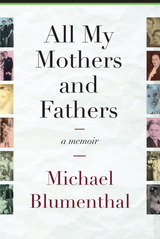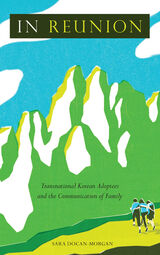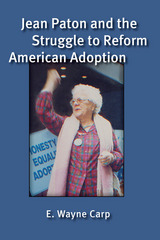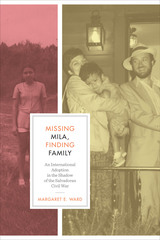
As fate would have it, his adoptive father, a German-Jewish refugee raised by a loveless and embittered stepmother after his own mother died in childbirth, has inflicted on his stepson a fate uncannily—and terrifyingly—similar to his own: Having first adopted Michael, in part, to help his dying wife, he then imposes on him the same sort of penurious and loveless stepmother whom he himself had had to survive. With these revelations, the "mysteries" that seem to have permeated Michael's childhood are laid bare, triggering a quest for belonging that will infiltrate the author's entire adult life.

Adoption is a hot topic--played out in the news and on TV talk shows, in advice columns and tell-all tales--but for the 25 million Americans who are members of the adoption triad of adoptees, adoptive parents, and birth parents, the true story of adoption has not been told until now. Family Matters cuts through the sealed records, changing policies, and conflicting agendas that have obscured the history of adoption in America and reveals how the practice and attitudes about it have evolved from colonial days to the present.
Amid recent controversies over sealed adoption records and open adoption, it is ever more apparent that secrecy and disclosure are the defining issues in American adoptions--and these are also the central concerns of E. Wayne Carp's book. Mining a vast range of sources (including for the first time confidential case records of a twentieth-century adoption agency), Carp makes a startling discovery: openness, not secrecy, has been the norm in adoption for most of our history; sealed records were a post-World War II aberration, resulting from the convergence of several unusual cultural, demographic, and social trends.
Pursuing this idea, Family Matters offers surprising insights into various notions that have affected the course of adoption, among them Americans' complex feelings about biological kinship versus socially constructed families; the stigma of adoption, used at times to promote both openness and secrecy; and, finally, suspect psychoanalytic concepts, such as "genealogical bewilderment," and bogus medical terms, such as "adopted child syndrome," that paint all parties to adoption as psychologically damaged.
With an unswerving gaze and incisive analysis, Carp brings clarity to a subject often muddled by extreme emotions and competing agendas. His book is essential reading for adoptees and their adoptive and biological families, and for the countless others who follow their fortunes.

“Susan Kiyo Ito is like a surgeon operating on herself. She is delicate, precise, and at times cutting with her words. But it is all in service of her own healing and to encourage us all to be brave enough to do the same in our own stories.” —W. Kamau Bell
Growing up with adoptive nisei parents, Susan Kiyo Ito knew only that her birth mother was Japanese American and her father white. But finding and meeting her birth mother in her early twenties was only the beginning of her search for answers, history, and identity. Though the two share a physical likeness, an affinity for ice cream, and a relationship that sometimes even feels familial, there is an ever-present tension between them, as a decades-long tug-of-war pits her birth mother’s desire for anonymity against Ito’s need to know her origins, to see and be seen. Along the way, Ito grapples with her own reproductive choices, the legacy of the Japanese American incarceration experience during World War II, and the true meaning of family. An account of love, what it’s like to feel neither here nor there, and one writer’s quest for the missing pieces that might make her feel whole, I Would Meet You Anywhere is the stirring culmination of Ito’s decision to embrace her right to know and tell her own story.

The paradoxes of adoption and reunion—shared history without blood relations, and blood relations without shared history—generate questions: What does it mean to be “family”? How do people use communication to constitute family relationships? How are family relationships created, maintained, and negotiated over time? In Reunion details adoptive and cultural identities, highlighting how adoptees often end up shouldering communicative responsibility in their family relationships. Interviews reveal how adoptees navigate birth family relationships across language and culture while also attempting to maintain relationships with their adoptive family members.
Docan-Morgan details the challenges, rewards, and contradictions of reunion. She also offers practical recommendations for transnational adoptees in reunion, adoptees considering reunion, adoptive families, and adoption practitioners.
In tracing the stories of the intercultural dynamics inherent in adoptees’ reunions, Docan-Morgan demonstrates the effort, flexibility, empathy, self-reflection, and time required to navigate long-term relationships with birth families.

Jean Paton (1908–2002) fought tirelessly to reform American adoption and to overcome prejudice against adult adoptees and women who give birth out of wedlock. Paton wrote widely and passionately about the adoption experience, corresponded with policymakers as well as individual adoptees, promoted the psychological well-being of adoptees, and facilitated reunions between adoptees and their birth parents. E. Wayne Carp's masterful biography brings to light the accomplishments of this neglected civil-rights pioneer, who paved the way for the explosive emergence of the adoption reform movement in the 1970s. Her unflagging efforts over five decades helped reverse harmful policies, practices, and laws concerning adoption and closed records, struggles that continue to this day.

In the spring of 1983, a North American couple who were hoping to adopt a child internationally received word that if they acted quickly, they could become the parents of a boy in an orphanage in Honduras. Layers of red tape dissolved as the American Embassy there smoothed the way for the adoption. Within a few weeks, Margaret Ward and Thomas de Witt were the parents of a toddler they named Nelson—an adorable boy whose prior life seemed as mysterious as the fact that government officials in two countries had inexplicably expedited his adoption.
In Missing Mila, Finding Family, Margaret Ward tells the poignant and compelling story of this international adoption and the astonishing revelations that emerged when Nelson's birth family finally relocated him in 1997. After recounting their early years together, during which she and Tom welcomed the birth of a second son, Derek, and created a family with both boys, Ward vividly recalls the upheaval that occurred when members of Nelson's birth family contacted them and sought a reunion with the boy they knew as Roberto. She describes how their sense of family expanded to include Nelson's Central American relatives, who helped her piece together the lives of her son's birth parents and their clandestine activities as guerrillas in El Salvador's civil war. In particular, Ward develops an internal dialogue with Nelson's deceased mother Mila, an elusive figure whose life and motivations she tries to understand.
READERS
Browse our collection.
PUBLISHERS
See BiblioVault's publisher services.
STUDENT SERVICES
Files for college accessibility offices.
UChicago Accessibility Resources
home | accessibility | search | about | contact us
BiblioVault ® 2001 - 2024
The University of Chicago Press









